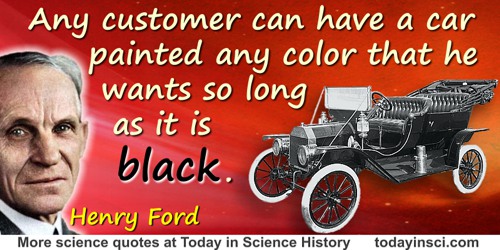Customer Quotes (8 quotes)
[I]magine you want to know the sex of your unborn child. There are several approaches. You could, for example, do what the late film star ... Cary Grant did before he was an actor: In a carnival or fair or consulting room, you suspend a watch or a plumb bob above the abdomen of the expectant mother; if it swings left-right it's a boy, and if it swings forward-back it's a girl. The method works one time in two. Of course he was out of there before the baby was born, so he never heard from customers who complained he got it wrong. ... But if you really want to know, then you go to amniocentesis, or to sonograms; and there your chance of being right is 99 out of 100. ... If you really want to know, you go to science.
In 'Wonder and Skepticism', Skeptical Enquirer (Jan-Feb 1995), 19, No. 1.
Any customer can have a car painted any color that he wants so long as it is black.
Remark made while announcing (1909) that production was being switched to only one model, the Model T. As quoted in Henry Ford and Samuel Crowther, My Life and Work (1922), 71. Often seen as a shorter paraphrase, such as “You can have any color as long as it's black.”
For five hundred dollars, I’ll name a subatomic particle after you. Some of my satisfied customers include Arthur C. Quark and George Meson.
Spoken by the character Dogbert in Dilbert comic strip (26 Jul 2003).
If you advertise to tell lies, it will ruin you, but if you advertise to tell the public the truth, and particularly to give information, it will bring you success. I learned early that to tell a man how best to use tires, and to make him want them, was far better than trying to tell him that your tire is the best in the world. If you believe that yours is, let your customer find it out.
As quoted by H.M. Davidson, in System: The Magazine of Business (Apr 1922), 41, 446.
In fulfilling the wants of the public, a manufacturer should keep as far ahead as his imagination and his knowledge of his buying public will let him. One should never wait to see what it is a customer is going to want. Give him, rather, what he needs, before he has sensed that need himself.
As quoted by H.M. Davidson, in System: The Magazine of Business (Apr 1922), 41, 413.
Just as certain as death, Westinghouse will kill a customer within six months after he puts in a [alternating current] system of any size.
Found in Jonathan R. T. Hughes, The Vital Few: American Economic Progress and Its Protagonists (1965), 194. The author did not use quotation marks, or footnote any source, but did skip to the next line and use indented lines, when he stated Edison’s stubborn (and rather malicious) opposition to alternating current for home service. [Webmaster, as yet, has not found any earlier use of these words attributed to Edison, and is therefore fairly skeptical, and doubts that this is a verbatim quote, because it seems to have no earlier provenance. But this book may have been used by others to repeat these words as a quote. For example, without citation, in Isaac Asimov, Isaac Asimov's Book of Science and Nature Quotations (1988), 71. Can you help identify a primary source?]
The oil industry is a stunning example of how science, technology, and mass production can divert an entire group of companies from their main task. ... No oil company gets as excited about the customers in its own backyard as about the oil in the Sahara Desert. ... But the truth is, it seems to me, that the industry begins with the needs of the customer for its products. From that primal position its definition moves steadily back stream to areas of progressively lesser importance until it finally comes to rest at the search for oil.
In 'Marketing Myopia' originally published in Harvard Business Review (). Reprinted in Harvard Business Review Classics: Marketing Myopia (2008), 66-71.
When you look at the companies that have really won customers over in technology—say, Apple and Google—you find that they spend billions of dollars on R&D [research and development] each year, often spending that much on a product before they ever make a dime back in profits. Unfortunately, in the environment, I don’t see as much willingness to invest heavily in R&D as I do in consumer technology. And that’s a pity.
From interview with Mark Tercek, 'Q&A With Ramez Naam: Dialogues on the Environment', Huffington Post (1 Jul 2013).

 In science it often happens that scientists say, 'You know that's a really good argument; my position is mistaken,' and then they would actually change their minds and you never hear that old view from them again. They really do it. It doesn't happen as often as it should, because scientists are human and change is sometimes painful. But it happens every day. I cannot recall the last time something like that happened in politics or religion.
(1987) --
In science it often happens that scientists say, 'You know that's a really good argument; my position is mistaken,' and then they would actually change their minds and you never hear that old view from them again. They really do it. It doesn't happen as often as it should, because scientists are human and change is sometimes painful. But it happens every day. I cannot recall the last time something like that happened in politics or religion.
(1987) -- 


